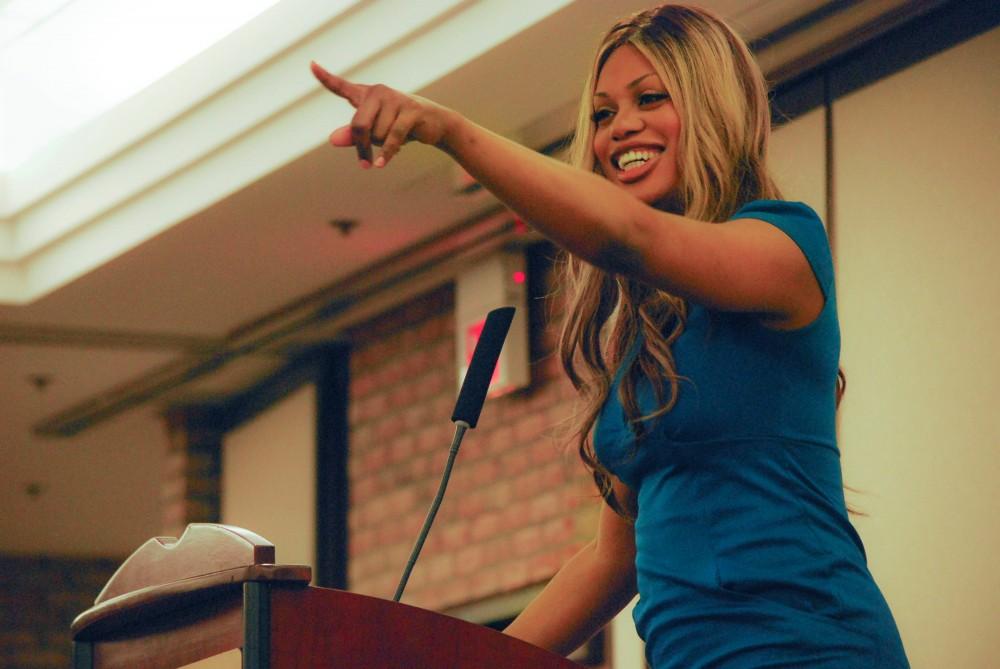Cox: ‘Transgender people could use a little justice, could use a little love’

GVL / Hannah Mico Laverne Cox visits the Ebrehard Center at Grand Valley’s downtown campus on Tuesday evening to speak about her transition into womanhood as a transgender woman of color.
Mar 19, 2014
Laverne Cox, known for her role on the hit Netflix original series, “Orange is the New Black,” and her status as a transgender woman of color, spoke before a packed room on Tuesday at Grand Valley State University.
Long before the start of the event, every seat was taken. By the time Cox was introduced by Student Senate Vice President for Diversity Affairs Anthony Clemons, people were crowding around the doorways in the hall outside the room to catch a glimpse of the actress.
“I stand before you this evening a proud African-American transgender woman,” Cox began her speech. “From a working class background, raised by a single mother, I stand before you an artist and an actress, a sister and a daughter.”
Cox told of her struggles growing up as a non-gender-conforming child in the South and her journey to where she is today. The actress began by reminding the audience of the statistics of violence and discrimination against transgender individuals and the LGBT community as a whole.
“Seventy-eight percent of all students in grades K through 12 that expressed a transgender or gender non-conforming identity has experienced harassment or bullying,” she said.
Cox went on to cite some of the people she draws inspiration from, including Sojourner Truth, from whom she borrowed the title of her speech, “Ain’t I a Woman?: My Journey to Womanhood.”
She spoke of how she was bullied throughout her school years for her gender non-conforming actions as well as her social status later on.
While her speech did not shy away from the realities of being a trans woman, she also spoke of how she has found success and does what she loves to do.
Cox congratulated GVSU on its plans to have gender neutral bathrooms in all academic buildings and encouraged the college to continue to make strides toward becoming more welcoming to members of the trans community as well as the larger LGBT community.
Cox suggested that GVSU install software on their computers that allows students to enter their preferred name rather than their legal name when registering for classes.
“For a lot of trans folks, especially for those that are transitioning and maybe haven’t changed their names yet, preferred name policies are really great,” Cox said. “You can register with your preferred name so your professors can see your preferred name, and a name that is not consistent with your identity won’t be called out in class. It makes the pedagogical situation a lot safer for trans students. That’s an important policy.”
Currently, students may change their names on Blackboard and on their student identification cards, but they must do so by submitting a request through the Registrar’s Office.
Cox also encouraged GVSU to increase the availability of spaces in which students can educate themselves about LGBT issues.
“A lot of the discrimination that trans folks experience is just that people don’t know any better,” Cox said. “I think there’s something about trans folks’ identities that if you’re not fully comfortable with who you are, someone coming and challenging your ideas of what it means to be a man or a woman can be really threatening. So often, particularly in college, we might not feel so secure about our manhood or our womanhood, and trans folks challenge that. Creating spaces where people can talk about that and feel safe to have those conversations (is important).”
Cox added that, to be more welcoming to the LGBT community, every individual at GVSU can stand up against policies and actions that are not inclusive or respectful of the LGBT community.
“In this age of social media, we don’t have to sit idly by,” she said. “We can all have a voice. We can all say, ‘This is not acceptable.’ Our voices can be heard if we have the audacity to speak in our various forms.”





















